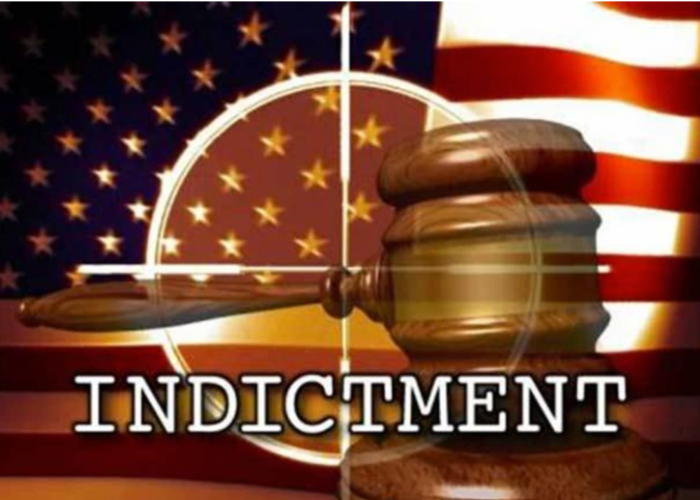In all adversarial proceedings, due process is the constitutional requirement to be notified and provided with an opportunity to be heard. In Criminal cases, this right occurs when an accused is formally charged. A formal charge can be found in written format, referred to as either an indictment, special presentment or accusation, and can vary depending upon the situation. Clearly put, imagine a traffic citation. The citation itself provides notice of the charges and always contains the process available to an individual if they wish to be heard.
An indictment is “a written accusation of a crime, made by a grand jury, and presented to the court for prosecution against the accused person.”[1] Although the word accusation is used in its definition, these terms should be distinguished. An Accusation is a written document, signed and issued by the prosecuting attorney, without the use of a grand jury and cannot be used once a grand jury has either heard evidence or conducted an investigation. Prior to understanding, in depth, what an Indictment is, one must first understand the steps leading to an indictment.
Criminal investigations begin once a law enforcement agency learns of or witnesses the commission of a crime. Evidence found during the course of an investigation is then forwarded to the prosecuting attorney who reviews the evidence and makes a decision as to what, and against who, criminal charges, if any will be filed. If someone is subsequently arrested, they are entitled to a “judicial determination of probable cause.” Referred to as a preliminary hearing, or commitment hearings in Georgia, occurs before a judge or judicial officer and can be waived by the defendant. If there is no arrest, the prosecuting attorney may present their findings to the grand jurors for a grand jury hearing. A grand jury hearing will prohibit the defendant from any further judicial determination of probable cause.
Grand jury hearings, unlike criminal trials are closed to the public and have different evidentiary requirements. As stated above, Grand Jury hearings are used to determine whether the prosecuting attorney has probable cause to proceed to trial. Probable cause is an evidentiary standard that lies between reasonable suspicion and beyond a reasonable doubt. A probable cause determination finds that it is more likely than not, or probable that the accused committed the charge or offense. Grand jurors are presented with evidence by the prosecuting attorney, after which, the grand jurors will deliberate and vote on the issue of probable cause. Although guaranteed under federal law, each State has its own rules and procedures that govern the use of grand jury hearings. For example, in Georgia, grand jury hearings are only required in capital offenses, requires a vote of at least 12, and there is no entitlement to a grand jury hearing or the issuance of an indictment in misdemeanor cases.
If the grand jurors find probable cause to believe that the accused committed the offense(s), the jurors will present an indictment to the court, referred to as a “true bill indictment.” If the grand jurors do not find probable cause, the prosecuting attorney will file the indictment with the clerk of court, referred to as a “no bill indictment.” In Georgia, a second true bill indictment for the same offense or charge, will be dismissed, and further prosecution is prohibited.[2] Whereas, a second no bill indictment for the same charge or offense, could bar any future prosecution.[3] In some jurisdictions, prosecuting attorneys are permitted to present their evidence directly to a grand jury, without a grand jury hearing. If the prosecuting attorney is successful, a direct indictment will be issued. Prosecuting attorneys in Georgia do not have statutory permission to seek direct indictments.
Indictments, although not determinative of the outcome at trial, are an important tool in the criminal process and one of, if not the first documents criminal defense attorneys will look at when preparing for trial. Criminal defense attorneys use indictments for a variety of reasons. For example, under Georgia law, if it is found at any time that a grand juror was ineligible to serve as grand juror when the indictment was returned, a criminal defense attorney could ask the court to dismiss the indictment.[4] As stated above, indictments are used to satisfy the due process guarantee of the Constitution in criminal trials. To reiterate, if the indictment is incorrect, in any way, how can one be sure that notification of the pending charges against him are proper? This question, is not one defendants should be expected to answer alone. For this reason, and all those implied above, it is imperative that those individuals with pending criminal charges retain an attorney as soon as possible. Having a criminal defense attorney verse in relevant statutes, case law, and authority could assist easing the uncertainties and confusions of a criminal trial.
[1]Black’s Law Dictionary, 891 (Bryan A. Garner ed. Deluxe 10th ed., 2014, 2009).
[2]O.C.G.A. § 17-7-53.1
[3]O.C.G.A. § 17-7-53
[4]O.C.G.A. § 15-12-60(d)

